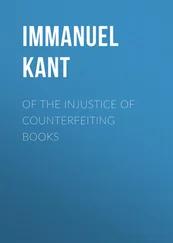The spurious axioms of the third kind from conditions proper to the subject whence they are transferred rashly to the object are plentiful, not, as in those of the Second Class, because the only way to the intellectual concept lies through the sensuous data , but because only by aid of the latter can the concept be applied to that which is given by experience, that is, can we know whether something is contained under a certain intellectual concept or not. To this class belongs the threadbare one of the schools: whatever exists contingently does at some time not exist . This spurious principle springs from the poverty of the intellect, having insight frequently into the nominal , rarely into the real , marks of contingency or necessity. Hence, whether the opposite of any substance be possible, an insight hardly obtained from a priori marks, is not otherwise known than by its being evident that at some time that substance was not; and changes rather witness contingency than contingency mutability, so that were nothing fleeting and transitory to occur in the world, a notion of contingence would hardly be possible in us. Therefore, though the direct proposition is perfectly true: whatever at some time was not is contingent , its converse indicates nothing but the conditions under which we can alone distinguish whether something exists necessarily or contingently. Hence if enunciated as a subjective law, which indeed it is, it should be enounced thus: Sufficient marks of contingency of that of which it is not evident that at some time it was not, are not, by common intelligence, given . This, however, tacitly deviates into an objective condition, as though in its absence there were no room for contingence; which being done, a counterfeit and erroneous axiom arises. For this world though existing contingently is sempiternal , that is, simultaneous with all time. It is a rash assertion that there was a time when it did not exist.
To these spurious principles must be added some others of great affinity with them, not imparting to the given intellectual concept any blemish of sensuous cognition, but deceiving the intellect so as to take them for arguments drawn from the object, though they are commended to us only by the peculiar nature. of the intellect for the convenience of its free and ample use. Therefore, these as well as those enumerated above, rest in subjective reasons, although not in the laws of sensuous, but in those of intellectual cognition itself, namely, in the conditions under which it appears easy and quick to the mind to make use of its insight. I shall beg leave to throw in here, by way of conclusion, some mention of these principles, not as yet, as far as I know, set forth distinctly. I call, then, principles of convenience rules of judging to which we freely submit, and to which we adhere as if they were axioms, for the only reason that, were we to depart from them, scarcely any judgment concerning a given object would be permissible to our intellect . In this list belong the following: First , that by which we assume that everything in the universe is done according to the order of nature , which principle by Epicurus was proclaimed without any restriction, and by all other philosophers unanimously with extremely rare exceptions, not to be admitted but from supreme necessity. Still we thus affirm, not on account of possessing so ample a knowledge of the events of the world according to the common laws of nature, or because the impossibility or smaller hypothetical possibility of supernatural things is plain to us, but because departing from the order of nature there would be no use for the intellect, the rash citation of the supernatural being the couch of lazy understandings. For the same reason we take care to shut out from the exposition of phenomena comparative miracles , namely, the influence of spirits, since, as we do not know their nature, the intellect, to its great detriment, would be turned aside from the light of experience, by which alone it is able to provide for itself laws of judging, into the night of species and causes unknown to us. The second is the partiality for unity proper to the philosophical mind, whence this wide-spread canon has flown forth: principles are not to be multiplied beyond supreme necessity , to which we give in our adhesion, not because we have insight into causal unity in the world either by reason or experience, but as seeking it by an impulse of the intellect which seems to itself to have by thus much advanced in the explication of phenomena, by as much as it is granted to it to descend from the same principle to a greater number of consequences, The third of this kind of principles is: matter neither originates nor perishes; all the changes in the world concern form only; a postulate which on the recommendation of common sense has spread through all philosophical schools, not because it is to be taken as having been found so, or as having been demonstrated by arguments a priori , but because if we were to admit that matter itself is fleeting and transitory, nothing at all that is stable and lasting would be left any longer to serve for the explication of phenomena according to universal and perpetual laws, and hence nothing at all would be left for the exercise of the intellect.
This method, especially in respect to the distinction between sensual and intellectual knowledge, which, when reduced by more careful investigation to exactness, will occupy the position of a propaedeutical science, will certainly be of unlimited benefit to all intending to penetrate into the very recesses of metaphysics.
Note.—As in this last section the tracing out of the method occupies all the space at disposal, and the rules prescribing the true form of arguing concerning sensuous things shine by their own light and do not borrow it from the illustrative examples, I have thrown in but a cursory mention of the latter. For this reason it is not strange if some things should seem to have been asserted with more audacity than truth, they certainly calling, when a broader treatment shall be possible, for greater force of arguments. Thus, what is alleged in paragraph 27 on the locality of immaterial substances lacks an explication which, if the reader please, may be found in Euler in the place cited, Vol. II, pp. 49, 52. For the soul is not in communion with the body as being detained in a certain place in the latter, but a determined place in the universe is attributed to it, for the reason that it is in mutual commerce with some body, which commerce being dissolved all its position in space is removed. Its locality , therefore, is derivative and contingently applied to it, not primitive and a necessary condition of its existence, because whatever things cannot by themselves be objects of external senses such as man’s, that is, immaterial substances, are exempt altogether from the universal condition of externally sensible things , namely, space. Hence absolute and immediate locality may be denied to the soul, while yet hypothetical and mediate locality may be attributed to it.
Table of Contents
1.To the words analysis and synthesis a two-fold meaning is commonly given; for the synthesis is either qualitative , a progress in a series of subordinates from the reason to the consequence, or quantitative , a progress in a series of coordinates from the given part through its complements to the whole. Similarly, analysis, taken in the first sense, is a regress from the consequence to the reason , but in the latter meaning a regress from a whole to its possible or mediate parts , that is, to the parts of parts; hence it is not a division but a subdivision of the given composite. Synthesis as well as analysis are here taken only in the latter sense.
Читать дальше












